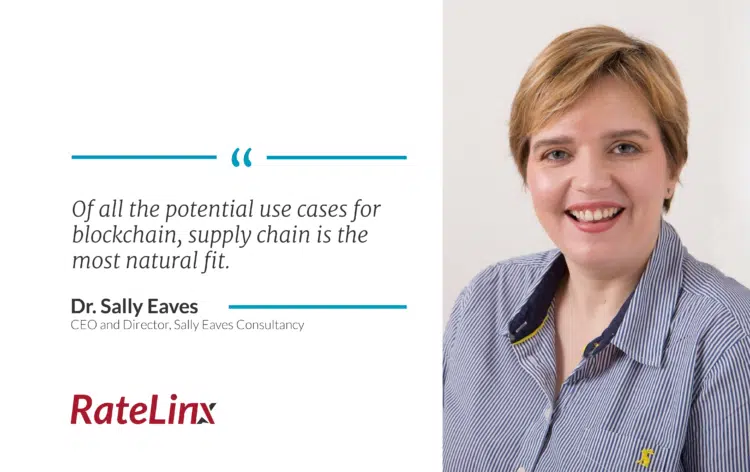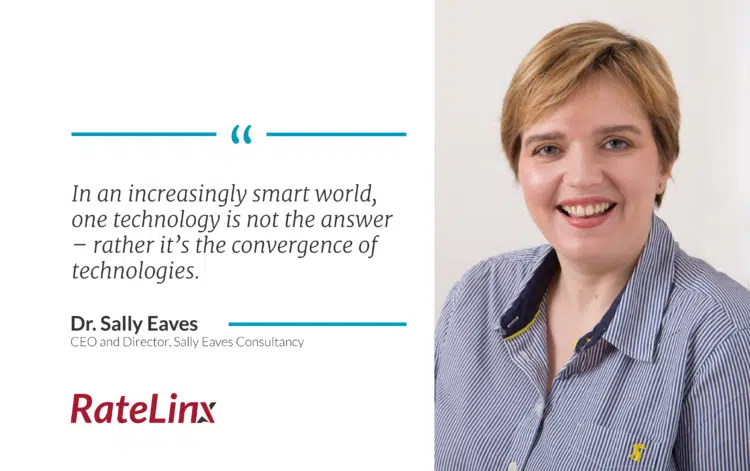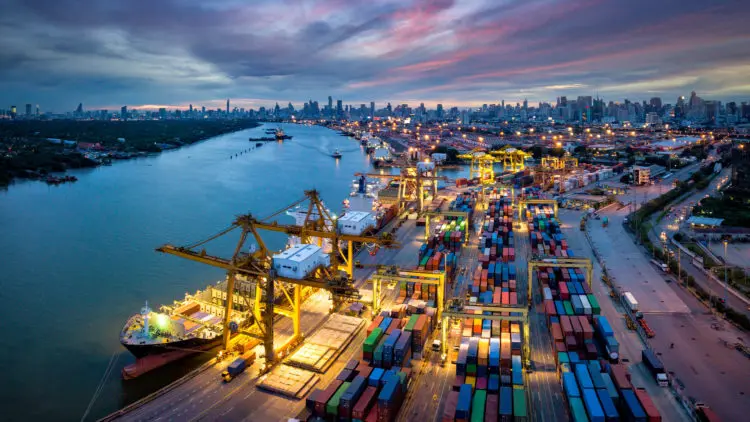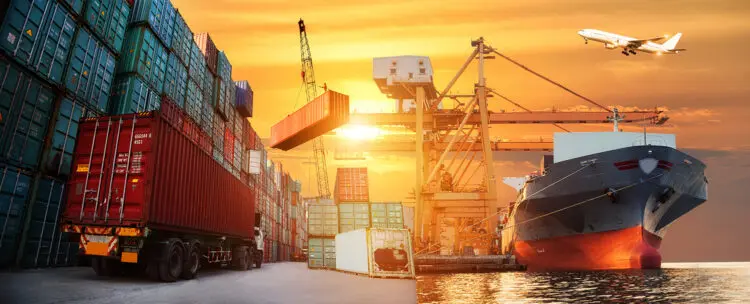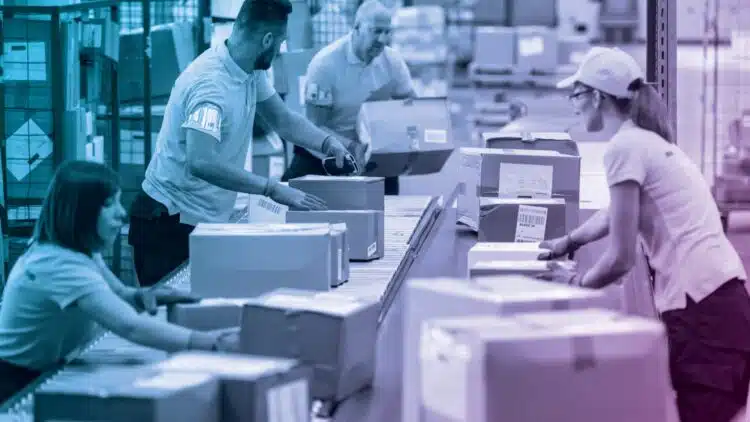The hype about blockchain around the supply chain has been deafening for nearly a decade. Futurists say it will utterly transform our economy, whether you’re ordering a pizza or developing a multinational supply chain strategy. But until recently, blockchain has seemed like one of those technologies that’s always poised to make a big splash, without ever reaching wide adoption.
Behind the breathless hype, however, there is a useful technology that has real and practical implications for supply chain leaders.
We asked expert Sally Eaves to help ground the blockchain conversation in the here-and-now. Sally is a member of the Forbes Technology Council and the Blockchain Social Impact Lead at the Government Blockchain Association. She is an experienced CTO, speaker, author, and researcher.
Featured Expert

Dr. Sally Eaves
Sally has recently been ranked 8th in the World in Blockchain impact and is continually ranked in the top 10 for digital disruption and across frontier technology subjects by leading bodies such as Onalytica. Sally is a member of the Forbes Technology Council, and the Blockchain Social Impact Lead at the Government Blockchain Association. She is an experienced CTO, speaker, author, and researcher. She hosts the podcast, Tomorrow’s Tech Today, which discusses the latest news, views, and experiences in Technology, Talent, and Transformational change.
Recommended Reading:
Q: What Is Blockchain and What Is It For?
Blockchain technology can simplify, record, track and secure transactions among parties, whilst embedding trust by design. A blockchain is a decentralized ledger or record of all the transactions in a network with the participants in this network confirming the transactions, known as ‘blocks’, themselves. This consensus effect can remove the need for the traditional trusted third-party intermediary role (e.g. broker, lawyer, etc). Meanwhile, cryptographic functions enable very high levels of security, negating tampering and revision.
In addition, the opportunity to create smart contracts offers significant value. This is business logic, set by computer code that defines the terms and conditions, enabling automatic monitoring, execution, and enforcement of an agreement. For example, this might be around the exchange of money, property, or information. Current applications of blockchain extend far beyond cryptocurrencies to areas such as supply chain management, finance, government and voting, health records, gaming, oil and gas, and fashion.
Q: What Is the Role of Blockchain in the Supply Chain?
Blockchain, as an immutable ledger, can accurately ‘track and trace’ the movement of goods in a supply chain. It establishes authenticity (proof of provenance) and improves transparency and efficiency. Blockchain also helps to reduce bureaucracy and the risk of both fraud and counterfeiting. It is notably useful for unexpected issues, for example, the almost immediate identification of bottlenecks or where participants cannot perform their desired function. This reduces delays and downstream disruptive impacts by enabling alternative options to be sourced.
A blockchain is a decentralized ledger or record of all the transactions in a network with the participants in this network confirming the transactions, known as ‘blocks’, themselves.
One of the key barriers in enabling expedient, effective, and explicit contractual agreements agreeable to all parties has been the lack of trust between demand, supply, and the financing mechanism. The capability to create self-executing smart contracts within blockchain is a key benefit here. This reduces transaction costs, embeds trust, and increases transparency. Blockchain can also help customers to make informed choices. For example, to know whether the products they are buying are sustainably sourced or ethically manufactured. Blockchain also enables customers to track commodities from source to shelf, or from farm to fork.
Q: What Are Specific Use Cases for Blockchain in the Supply Chain?
Of all the potential use cases for blockchain, supply chain is the most natural fit. One notable application is the ‘last mile’ within the pharmaceutical industry where the counterfeiting of medicines remains a huge issue. Leveraging blockchain technology can enable the legitimacy of a drug to be verified with its manufacturer prior to administration. It also enables the seamless ‘track and trace’ of medicines as they move through a pharmacy. Recent research based on pilot studies with blockchain technology estimates $180 million in savings each year.
The COVID19 situation is also very relevant. Legacy procurement systems for vital medical supplies are too slow. There have been many examples of trust breakdowns from product requirements, supplier credentials, and payments to customer certification, and transportation visibility. Further examples are proof of authenticity for luxury goods and the tech industry, ensuring that components for multiple high tech products, from cars to consumer electronics, are both genuine and safe.
You may also be interested in…
-
Supply Chain & Logistics Leaders: Here’s Your 5-Year Plan for Technology, Process, and People & Predictions to What the Future Holds for Supply Chain Management
-
Intelligent Transport: How Transportation Data Will Change the Way We Move
-
Beyond Silo-Breaking: Building a Trusted Data Ecosystem with Scott Taylor
Q: How Does Blockchain Complement Other Technologies?
In an increasingly smart world, one technology is not the answer – rather it’s the convergence of technologies. Supported by 5G connectivity and with billions of IoT devices, enterprise blockchain technology will become particularly important. Additionally, there is great potential in blockchain for data-heavy and data-sensitive supply chains, from healthcare to logistics. The combination of blockchain and artificial intelligence is especially relevant here. The development of AI depends on data, and blockchain can enable its safe, coherent, and secure storage and exchange. In addition, blockchain helps to trace and determine the logic behind algorithmic decision-making processes.
Q: What’s the Current State of Supply Chain Adoption?
Gartner estimates blockchain will generate US$3.1 trillion in new business value by 2030. The technology is set to be ready for mainstream adoption through 2023. I anticipate that the adoption of blockchain-based supply chain systems will increase dramatically.
This is not merely conceptual, research or pilot orientated. But rather, we are seeing specific real-world examples such as tracking international cargo in real-time, improving the traceability and monitoring of food supplies, and supporting relief efforts in disaster scenarios through optimized logistics. Indeed, I am especially optimistic about the growing application of blockchain for both digital and societal transformation. As an exemplar of tech for good, identity authentication via trusted blockchain systems can enable access to essential services. This includes healthcare, finance, education, and voting rights where this had been previously almost impossible to achieve.

